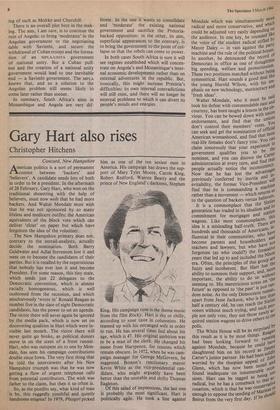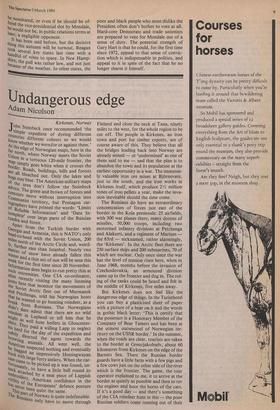Gary Hart also rises
Christopher Hitchens
Concord, New Hampshire
American politics is a sort of permanent contest between 'backers' and 'believers'. A candidate needs lots of both in order to be a president. In the aftermath of 28 February, Gary Hart, who won on the traditional shoestring with the help of believers, must now wish that he had more backers. And Walter Mondale must wish that he was not sponsored by so many lifeless and mediocre outfits; the American equivalents of the block vote which can deliver 'clout' on paper but which have forgotten the idea of the volunteer.
The New Hampshire primary does not, contrary to the entrail-analysts, actually decide the nomination. Both Barry Goldwater and Adlai Stevenson lost it and went on to become the candidates of their parties. But it is recalled by the superstitious that nobody has ever lost it and become President. For some reason, this tiny state, which sends just 22 delegates to the Democratic convention, which is almost racially homogeneous, which is well cushioned from the recession, and which mischievously 'wrote in' Ronald Reagan as number five in the slate of eight Democratic candidates, has the power to set an agenda. The victor there will never again be ignored by the media pack, which is now set on discovering qualities in Hart which were in- visible last month. The victor there will never quite go broke, as political donors move in on the scent of a front runner. Hart, who was outspent six to one by Mon- dale, has seen his campaign contributions double since Iowa. The very first thing that he told the interviewers after his New Hampshire triumph was that he was now getting a flow of urgent telephone calls from potential contributors. The wish was father to the claim, but then it so often is.
So, as the pundits say, what kind of man is he, this ruggedly youthful and quietly handsome enigma? In 1979, Playgirl picked
him as one of the ten sexiest men in America. His campaign has drawn the sup- port of Mary Tyler Moore, Carole King, Robert Redford, Warren Beatty and the prince of New England's darkness, Stephen
King. His campaign tune is the theme music from the film Rocky. Hart is shy or chilly, according to your taste in columnists. He teamed up with his estranged wife in order to run. He has several times lied about his age, which is 47. His original ambition was to be a man of the cloth. He changed his name from Hartpence, for reasons which remain obscure. In 1972, when he was cam- paign manager for George McGovern, he suggested Boston's reactionary mayor Kevin White as the vice-presidential can- didate, who might arguably have been better than the unstable and shifty Thomas Eagleton.
Of this salad of impressions, the last one is probably the most significant. Hart is politically agile. He took a line against
908; radical and more conservative, and which could be adjusted very easily depending on the audience. In one key, he sounded like the voice of the student radical stifled by Mayor Daley — in vain against the Party machine and the rule of the political bosses. In another, he denounced the record of Democrats in office as one of thoughtless big spending, welfare and protectionisin. These two positions matched without being symmetrical. Hart sounds a good deal like the young Harold Wilson, with his em" phasis on new technology, meritocracy an 'fresh ideas'. Walter Mondale, who it must be sail! took his defeat with commendable ease and courtesy, has been taught a lesson in the ob" vious. You can be bowed down with un.i°„11, endorsement, and find that the lima"' don't control their members' votes. Y°_,11 can seek and get the nomination of official American womanhood, and find that Most real-life females don't fancy you. You can claim sonorously that your experience in government qualifies you to be the nominee, andyou can disown the Carter administration at every turn, and find that people actually notice the inconsistency' Now that, he has lost the advantages previously conferred by inertia and ill„; evitability, the former Vice-President will find that he is commanding a machine rather than a movement — which returns us to the question of backers versus believers. It is a commonplace that the Sixties generation has traded in its idealism and its commitment for mortgages and station wagons. Like most commonplaces, this idea is a misleading half-truth. There are hundreds and thousands of Americans, in- fluential in their communities, who hay, become parents and householders an ut teachers and lawyers, but who have nae forgotten (as who could?) the formally., years that led up to and included the Nix°`; era. Often, the principles of this grouP fuzzy and incoherent. But Hart has he hootimportant, to summon their support, and, 111ou!°r_. important, the ability to do so wi seeming to. His meretricious stress on Ill_e, future' as opposed to 'the past' is just ranr, dom noise. As the only Democratic runneo apart from Jesse Jackson, who is less than half a century old, he can reach the Sixties voters without much trying, and such Peu_ ple not only vote, they use those newly a, pqoulilrsed station wagons to drive others to the this hreesWulthiates Hit otus sbeywmillobste tabsibst;rsp. g surprised by
W
ai had been looking forward to run against Mondale, because he could ha slaughtered him on his record as Jinirinit,' Carter's junior partner. He had been 1111,10) worried by the thespian appeal of -1°1_,'A Glenn, which has now been tested ca; found inadequate on innumerable a too sions. Hart can be tagged as being „c. radical, but he has a comeback to thatrive cusation, which is that he was consery a_ to enough to oppose the sending of Marine:lid Beirut from the very first day. If he should be nominated, or even if he should be of- fered the vice-presidential slot by Mondale, Ile Would not be, in public relations terms at least, a negligible opponent. .It has been said before, but the decisive thing this autumn will be turnout. Reagan took several key states last time with a handful of votes to spare. In New Hamp- shire, the poll was rather low, and not just because of the weather. In other states, the
poor and black people who most dislike the President often don't bother to vote at all. Hard-core Democrats and trade unionists are prepared to vote for Mondale out of a sense of duty. The potential strength of Gary Hart is that he could, for the first time since 1972, appeal to that sense of convic- tion which is indispensable in politics, and appeal to it in spite of the fact that he no longer shares it himself.











































 Previous page
Previous page